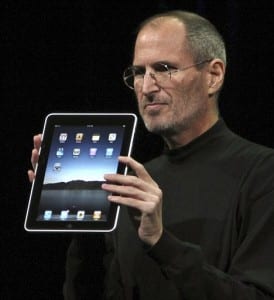Apple recently posted quarterly revenues of $20.34 billion, a record high.
This is a far cry from the days when Steve Jobs became “interim CEO.” Then they were on the brink of bankruptcy, now they’ve changed the world. And yet what the what turned Apple upside down wasn’t the technology or the revolutionary products–it was one man’s focus on purpose.
Great entrepreneurs start with a purpose that goes beyond making money.
Don’t get me wrong–they make money but also set out to change the world in some way.
Whether it’s a Coca-Cola:
“To refresh the world; to inspire moments of optimism and happiness; to create value and make a difference.”
Or the early Ford:
“To democratize the automobile.”
Or a Google:
“To organize the world’s information and make it universally accessible and useful.”
It’s a known fact that great companies like Wal-Mart, Southwest Airlines, Charles Schwab, and BMW are all purpose-driven. In fact, John Mackey, CEO of Whole Foods Market, recently stressed the importance of companies having a core purpose.
These entrepreneurs do more than make money…they “change the world!”
The purpose embedded in Apple’s DNA has always been “to democratize technology.” But when Apple was under the leadership of John Sculley (after Jobs was kicked out) it focused more on marketing than engineering; on pointing out past successes than looking for future opportunities.
It lost sight of its purpose.
According to Jobs,
“Apple was in very serious trouble. Apple had to remember who Apple was because they’d forgotten who Apple was.”
That set the tone for a very expensive downward spiral. It needed it purpose driven founder to bring it back from bad to good to great.

Another thing: we call Steve Jobs a visionary (which he is) but that vision flowed out of his purpose.
Huh??!!
Let me explain. A vision always comes from a company’s purpose; but the purpose of the vision is to fulfill the purpose of the company:

A strong purpose is the starting fundamental of all great companies; and most companies get in trouble when they lose sight of it. When Jobs came back that was the first thing he focused on.
According to Nilofer Merchant, a former Apple employee, and founder of Rubicon:
“He refocused the strategy to be about one thing. That meant he killed off even good things. I led server channel management at Apple when Jobs returned to the company in 1997, and I was there when he made the decision to shut down big portions of revenue-generating businesses (including my division) because they didn’t fit with his vision for the company. Some people thought he was crazy. But he was being extremely clear, and in doing so, he ‘MurderBoarded’—eliminated many options to get one cohesive strategy—his way to greatness.”
So what can purpose do for you?
What do you think?
The following an in excerpt from my ebook What Steve Jobs Could Teach Gen Y Startups. Download your FREE copy here.


